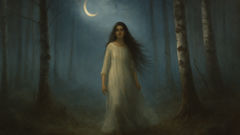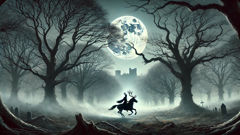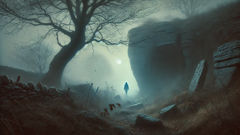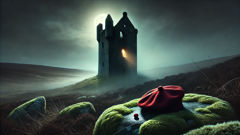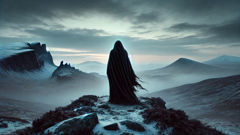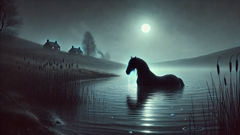Introduction
In the heart of medieval Podlasie, Poland, nestled between shadowy birch forests and veiled by morning mists, lay a village whose name faded from maps long ago. The villagers here knew the world was more than what eyes could see by sunlight. They spoke in hushed voices about spirits that roamed the woods, and every household kept bundles of dried herbs above their doorways, hoping to ward off what might slip in from the darkness. But there was one spirit whose legend made even the bravest men draw their shutters tight when dusk deepened—the Mora. She was said to be beautiful beyond earthly measure, her eyes shining like moonlight on winter ice, her laughter soft as the wind that whispers through pines. The Mora would come at midnight, slipping into men’s dreams. There, she’d take on the form of a woman they longed for or had lost, weaving visions so vivid that desire itself became a curse. Some men awoke weeping, others fevered with longing, and a few—so the stories went—never truly woke again. It was a tale passed from mothers to sons, warning them not to let their hearts wander too freely or their spirits stray too far from the warmth of home. Yet in every generation, there was one who believed he might resist her call or even win her heart. In this village, that soul was Jakub, a humble woodcutter whose quiet life would soon unravel beneath the Mora’s gaze. His tale, whispered through the centuries, is a tapestry of longing and regret, of midnight trysts and ancient curses, spun beneath the sighing boughs of the Slavic wilds.
I. The Whispering Pines
Jakub was not a man given to superstition. Tall and broad-shouldered, with hands roughened by years of splitting logs and mending roofs, he lived alone on the village’s edge where the pine forest pressed close. Each day at dawn, he trudged into the trees, his axe slung over one shoulder, humming tunes his mother once sang to drive away fear. The forest was his livelihood and sanctuary—its scents of resin and earth, its choir of birds and distant wolves, all as familiar as his own heartbeat. Yet even Jakub knew the rules: never answer voices calling from the darkness, never accept gifts left at your doorstep after sunset, and never—under any circumstance—speak of your heart’s deepest longing aloud, not even to the trees.
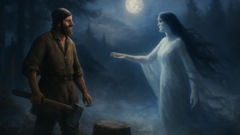
The summer Jakub turned twenty-seven, the air hung heavy with more than just humidity. Strange things began to happen. Nightly, the village dogs howled at unseen figures drifting between the trunks. Children woke screaming from dreams filled with weeping women. Old Stanislaw, the village’s carpenter, was found wandering naked at dawn by the riverbank, muttering about a kiss as cold as snow. "It’s the Mora," whispered the babushkas, their rosaries clicking with each prayer. "She’s restless this year."
Jakub listened to their warnings with a respectful nod but carried on as always. He had no wife to lose him to longing, no secret heartbreak that might draw the Mora’s attention—or so he believed. But one night, as a thunderstorm raged and lightning splintered the sky, Jakub dreamed of a woman. She stood beneath the pines in a gown white as fresh snow, hair spilling like ink down her back, eyes the color of frozen lakewater. She beckoned him with a single finger, her voice echoing in his mind: "Come to me, Jakub."
He woke shivering, his body damp with sweat, heart galloping in his chest. The dream felt more real than any memory. For days, her image haunted him—her scent of wild violets and rain, her laughter that seemed to ripple through the very air. He could not eat, could not work. When he closed his eyes, he saw her waiting among the trees.
Desperate, Jakub visited Baba Jagna, the village wise woman. Her cottage was a riot of drying herbs and curling smoke. “You have seen her, haven’t you?” Jagna rasped, peering at him with one good eye. Jakub tried to deny it, but the words stuck. Jagna laid a wrinkled hand over his and spoke in a whisper: “The Mora comes to those who have lost something or who desire what they should not. She feeds on longing. Did you call out to her?”
He shook his head. Jagna handed him a pouch of mugwort and warned, “Sleep with this under your pillow. Speak no more of your dreams.” Jakub did as told, but the dreams returned—each night more vivid, more consuming. In them, the Mora grew bolder. She danced in moonlit glades, her laughter tugging at his soul. When he tried to touch her, she slipped away like mist, leaving him breathless and aching with need.
Villagers began to notice his distraction. The innkeeper’s daughter, Magda, flirted with him in vain. His friends teased, then worried as Jakub’s strength waned and shadows deepened beneath his eyes. Word spread that the Mora had chosen him. Some left offerings at his door: bread, salt, a braid of garlic. Others whispered that he should leave the village for good before his curse spread.
One night, unable to bear it any longer, Jakub followed the path of his dream into the forest. The trees seemed to bow around him, their leaves shivering with secrets. Deep within the pines, he found her—more beautiful than ever, her skin shimmering with unearthly light. She smiled, sad and inviting, and spoke with a voice like the rush of distant water: “Why do you seek me, Jakub?”
He answered honestly: “Because I cannot forget you.” She reached for his hand, her touch icy and electric. “Then you will never leave this forest,” she whispered. The world spun as she drew him into an embrace, and in that moment, Jakub felt both terror and peace. The Mora’s kiss was cold as death, sweet as the promise of spring.
At dawn, the villagers found Jakub’s axe planted deep in the moss, but Jakub himself had vanished. Some claimed they saw him wandering in the mist for years after, a pale figure haunted by longing, forever chasing shadows among the whispering pines.
II. The Dreaming Hour
In the weeks after Jakub’s disappearance, the village fell into unease. The air felt thick and expectant, as if every shadow concealed eyes. Some whispered Jakub had been taken to the land of the dead; others insisted he’d simply gone mad and wandered off. But when men across Podlasie began to complain of restless sleep—visions of a midnight woman who beckoned and vanished—fear rooted itself deep.
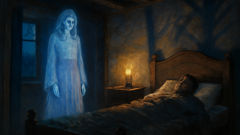
Among those tormented was Piotr, the blacksmith, whose wife had died two winters before. His dreams were filled with her face—soft, smiling, but tinged with sorrow. She’d reach out as if to embrace him, but her hands were cold and her eyes unfamiliar. Each morning, Piotr awoke hollowed out, his strength draining as if siphoned by unseen hands. He tried everything: holy icons, silver under his pillow, even sleeping with his boots on. Nothing worked.
Word spread to neighboring villages. A traveling priest arrived, bearing relics and prayers to drive away evil. He blessed every home and burned incense in the square, but the dreams only intensified. Soon, women noticed their husbands growing thin and silent; the children, too, grew restless, complaining of lullabies sung by voices not their mothers’. Desperation led to old remedies. Fires were kept burning through the night, and mirrors were covered to prevent the Mora from slipping through their silvered glass.
One night, during the waxing moon, Magda—the innkeeper’s daughter—watched her father toss in his sleep, sweat beading his brow. Suddenly, he gasped and woke, eyes wild. “She called me by name,” he whispered, trembling. “She said she knew my heart’s grief.” Magda saw then a single white hair upon his chest—a mark of the Mora’s touch.
The villagers gathered in the chapel, begging for answers. Baba Jagna stood before them, her voice grim: “The Mora is not merely a thief of dreams. She is sorrow itself. She comes for those who have lost or yearn for what cannot be.”
When asked how to stop her, Jagna shook her head. “There is no banishing what lives in men’s hearts. Only by facing what you fear most can you break her hold.”
Determined to save her people, Magda decided to act. That night, she brewed a tea of valerian and rowan berries, then sat vigil by her father’s bedside. At midnight, a chill swept through the room. The candle guttered. In the flickering light, Magda saw her father’s face relax into a strange serenity, his lips murmuring a name—her mother’s. The Mora appeared, standing at the foot of the bed: beautiful, terrible, eyes glistening with ancient grief.
Magda confronted her. “Why do you haunt us? What do you want?”
The Mora’s reply was soft as falling snow: “I am what you cannot let go. I am the shape of every loss, every desire unspoken. I come when the heart is open and the world is dark.”
Magda’s courage faltered, but she pressed on. “Let my father go.”
The Mora gazed at her with a pity so deep it felt endless. “I cannot take what is not freely given,” she said. “But know this—every man who clings to memory or longing feeds me. If you wish for peace, teach them to let go.”
At dawn, Magda found her father sleeping soundly for the first time in weeks. The white hair was gone. The villagers slowly began to heal, but never forgot the lesson: that longing, if left untended, could become a spirit more powerful than any spell.
Conclusion
The legend of the Mora lingers in the forests and quiet villages of Podlasie, threading through generations like an unbroken song. Jakub’s fate remains a warning—one told by firelight on cold nights when the wind rattles the shutters and the moon hangs low over the trees. The villagers never truly banished the Mora, for she was not a creature to be hunted or destroyed but a reflection of their own hearts’ shadows. The wise remembered Baba Jagna’s words: to fear the Mora is to fear one’s own longing. In time, the village rebuilt itself—not by erasing sorrow but by learning to share it, to speak openly of love and loss, to cherish what was present and forgive what could never be reclaimed. Some say that, even now, if you wander too deep into the woods when the mist is thick and the world feels raw with longing, you might catch a glimpse of her—a beautiful woman standing beneath the pines, her eyes reflecting all the desires you’ve ever tried to bury. If you do, heed the old warning: do not follow where she leads, and do not speak your secrets to the night. For in every heart lies a story, and in every story, the Mora waits—patient, eternal, a spirit woven from the dreams and sorrows of humankind.

